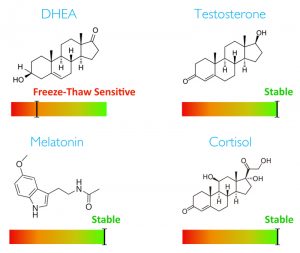Drop Date: May 2017
SBB – Measuring Multiple Analytes
In This Drop: Keeping the Science in Saliva When Measuring Multiple Analytes
How to Measure Multiple Salivary Analytes from the Same Sample
Understanding how to properly incorporate multi-analyte measures ensures that researchers produce high-level research with scientifically credible results – But how do you maintain sample integrity across your multi-analyte study? This edition of the Salivary Bioscience Bulletin explores frequent scientific and practical questions, such as: How many samples do I need to collect? What should the proper collection method be? How do I properly store my saliva samples? What is the proper sequence of assays when running large sample volumes for multiple analytes?
Salimetrics has both invested in and collaborated with the research community to develop best practice collection methods, protocols, and products that make accurate multi-analyte measurements possible. Salimetrics experts maintain the latest information and are readily available to help researchers incorporate multiple analytes into research. Below is a quick overview to help make incorporating multiple analyte measurements into your study easy.
Guidelines for Multi-System Measurement in Salivary Bioscience
Collection Method:
- If you want to maximize your data and increase compliance, utilize sample collection methods that improve participant compliance by reducing participant burden. Also, consider the total number of samples and sample volume being requested within a specified timeframe from each participant.
- Passive drool is the recommended collection method, as it is approved for all salivary analytes. However, SalivaBio Swabs are also approved for many analytes and Oral Swabs are preferred if including DNA analysis. Remember that it is possible to analyze multiple analytes, and include DNA analysis for genetic markers, from the same sample.
Volume Required:
- Increasing volume requirements can impact participant compliance. Choose a collection method that makes collecting appropriate volumes easy and, if swab-based, maximize volume recovery.
- To determine total volume, simply add the recommended sample volume of all analytes together and then add an extra 300 µl to account for any sample handling loss and possible repeat analysis.
- Some Salimetrics’ SalivaLab test-panels, require as little as 100 µl sample per panel.
Sample Storage & Handling:
- Before freezing, know if the analytes you are measuring are stable or sensitive to repeated freeze-thaws. To minimize freeze/thaw cycles, we recommend testing multiple analytes on the same day, but with fewer samples to decrease burden on the assay technician. Alternatively, you can aliquot collected saliva into smaller volumes before freezing, with the awareness that concentrations between aliquots can differ slightly when handling fresh saliva.
| Robust (Multiple (up to 3) freeze-thaw cycles permitted) |
Freeze-Thaw Sensitive (Single freeze-thaw cycle permitted) |
|---|---|
| Cortisol | Estrogens (E3,E2,E1) |
| Melatonin | Progesterone, 17OH-Progesterone |
| Testosterone | DHEA/DHEA-S |
| Alpha-Amylase | Androstenedione |
| Cotinine | Cytokines (IL-1B, IL-6, TNF Alpha) |
| Neopterin | C-Reactive Protein |
| Total Protein | Oxytocin |
- Freeze all samples immediately or as soon as possible after sample collection at or below 20 °C (the temperature of a normal household freezer).
Sample Testing:
- For large sample volumes, we recommend prioritizing assay order by testing unstable analytes first and applying this schedule consistently across all samples. If several sensitive analytes are being tested, we would recommend aliquoting samples either prior to the first freeze-thaw, or aliquoting the supernatant into smaller test volumes after the first freeze-thaw.
- Be sure to choose an experienced testing lab capable of running multiple assays in the same day and maintaining sample integrity throughout the testing phase of your study.
To further simplify Salivary Bioscience access for researchers, Salimetrics has introduced a new salivary cytokine panel, as the first offering in a series of upcoming panels to facilitate multiple analyte studies, provide greater insight into intra- inter-individual activity, and assist researchers investigating the processes and functions of complex biological systems. Salimetrics panel testing service presents this opportunity for researchers to easily add multiple analytes to research studies without additional saliva sample volume requirements. The first panel measures four cytokines (IL-1 Beta, IL-6, IL-8, & TNF-Alpha) in a single assay that requires collecting only 100 µL of saliva. In addition to saving sample volume, the cytokine panel also features efficient panel pricing. If you’re interested in what Salimetrics test-panels can add to your research, click here.
*Note: Salimetrics provides this information for research use only (RUO). Information is not provided to promote off-label use of medical devices. Please consult the full-text article.
 Contact: Salimetrics (USA)
Contact: Salimetrics (USA)
